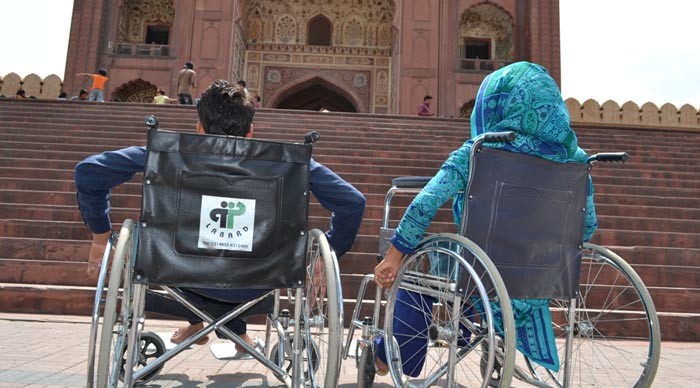

Shafiq-ur-Rehman, 38, became a victim of polio at an early age. His parents told him, it was probably the administration of an expired polio vaccine that crippled him forever.
He’s been in a wheelchair for the last 12 years.
For many years, he moved around without a wheelchair. He would use his hands to get the push he required from the ground to keep himself in motion.
He recalls, he had to wait for long hours at the bus stop to board a public transport vehicle. As he approached the bus, the conductor would thump the bus with his hand and ask the driver to speed up -- "Maazor sawaari aye, jaan deo (It’s a disabled passenger, keep going)", he says.
Shafiq does not solely blame the drivers and conductors for this attitude. It’s the way the buses are designed that makes boarding it a cumbersome process for a disabled -- and those helping him too. Even if a vehicle stops, to board a disabled passenger two or three people have to get down and lift the person and his wheelchair.
This is just a glimpse into the life of a disabled person, says Shafiq who disagrees with conventional definitions of disability -- it’s the lack of an enabling environment around that makes a person feel disabled.
Shafiq feels disabled in Lahore but not in Tokyo -- where footpaths are made at zero-step level, buildings, parking slots and toilets are disabled-friendly, there are brail blocks and robotic wheelchairs for the ease of severely handicapped persons.
Shafiq-ur-Rehman has set an example by doing something which the state should have done much earlier. As head of Milestone -- an NGO for the disabled run by the disabled -- he has imported manual and electric wheelchair technology from Japan. With the help of this technology transfer, these wheelchairs will be available for Rs 11,000 and Rs 40,000 respectively -- fraction of what they cost in Japan.
"These wheelchairs will revolutionise the lives of the disabled. These are custom-made and not the ones that we mostly see in Pakistan -- which are nothing more than wheelbarrows."
The infrastructure flaws and social attitudes aggravate the disability and push them into isolation. "Isolation starts at the school level where the noble and the disabled are sent to different systems," says Usman Zia, Principal of the Lahore Business Association for Rehabilitation of the Disabled (LABARD). This he says is against the concepts of accessibility and inclusion of persons with disabilities enshrined as fundamental rights by the UN Convention on the Rights of Persons with Disabilities (CRPD).
Zia says in the US, only three per cent of the persons with profound disability go to special education schools and the rest are enrolled in normal schools. Those with mild, moderate and severe disabilities are accommodated in normal schools with altered building structures, education plans and creating a Least Restricted Environment (LRE).
This can be done in Pakistan as well by setting up resource rooms in schools with facilities for special children. For example, Zia says by providing facilities to a blind student to get a book issued from the school library, get it scanned and converted into text and then ask a computer to read it to him -- using text to speech software. Even Urdu text to speech software is easily available in the market.
Around 6.5 million disabled children of school-going age are out of school at the moment and as per WHO estimates 10 per cent of Pakistan’s population is suffering from different forms of disability.
Zia participated in a survey conducted in Rao Khan Wala, a small village near Kasur, Punjab, where on average every household had two to three disabled children. "These children can be brought to the mainstream by enrolling them in schools. A deaf and dumb person complained that nobody knows sign language in the village. Just imagine, if there are 10 to 20 such students in a normal school, all the others will become familiar with sign language which will help them communicate with each other effectively in practical life," he adds.
Dr Khalid Jameel Akhtar, founder and head of rehabilitation department Mayo Hospital Lahore, is a person who has fought with disability for decades. He suffered from spinal injury when he was a student of King Edward Medical College. Over decades, he has reached a conclusion that the disabled should not wait for the society to adapt itself. "The disabled should adapt themselves to society and struggle to overcome inhibitions which are many."
Dr Akhtar cannot walk long distances. He calculates distances and identifies spots where he can get support for a few seconds and then proceeds further. He, however, calls on the state to honour its promises such as provision of 2 per cent quotas in jobs, 50 per cent concession in travel expenses, health facilities, tax exemptions, duty-free imports of disability-related aids and more. Such promises are made but there is no follow-up as the disabled are marginalised and do not have a voice.